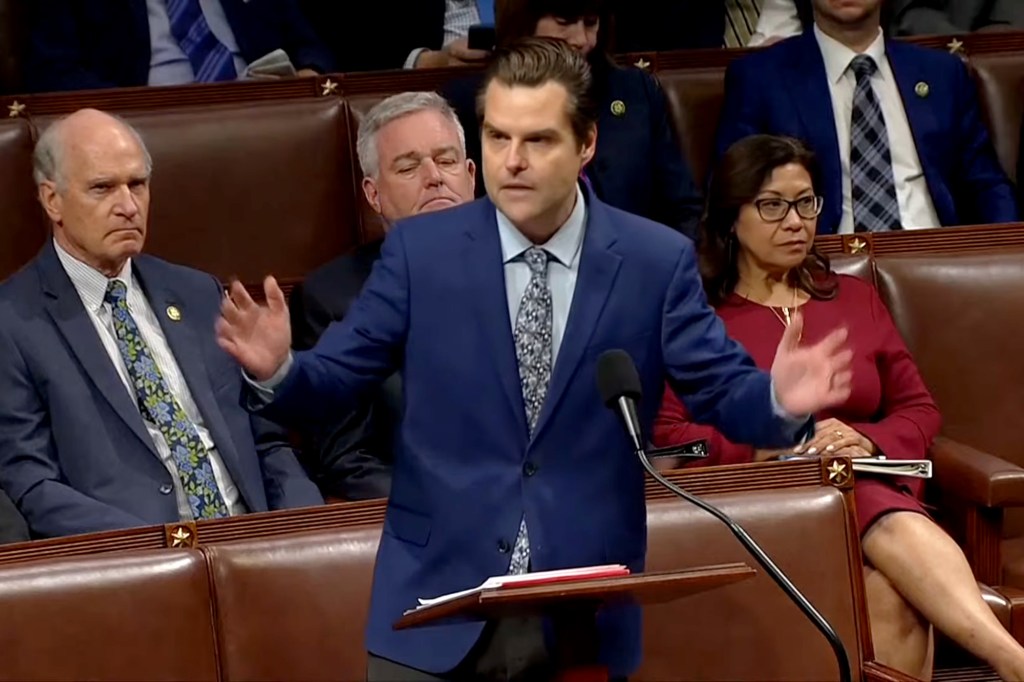Who will be the next Speaker of the House?
Rep. Kevin McCarthy lost his position as speaker of the House Tuesday after a historic vote to oust him from the powerful position.
The resolution to strip McCarthy (R-Calif.) of the gavel, led by Rep. Matt Gaetz (R-Fla.), passed 216-210 — with Gaetz and seven other Republicans joining 208 Democrats in voting to remove the California Republican from the speakership.
The lower chamber is now tasked with electing a new speaker before it can move forward with any other business.
While McCarthy is now the first House speaker to ever be stripped of his power, the process for selecting a new leader of the lower chamber will be reminiscent of the four-day, 15-ballot election in January that resulted in McCarthy’s elevation.
Temporary speaker replaces McCarthy
Rep. Patrick McHenry (R-NC), a staunch McCarthy ally, has been appointed speaker pro tempore and will oversee the House until a permanent speaker is elected.
McHenry was chosen because his name topped a list of replacements that McCarthy was required to provide the House clerk in January.
Speakers have been required to submit a non-public succession list since 2003, part of a post-9/11 contingency plan to keep the government functioning in the event of a foreign attack or other catastrophe.
As speaker pro tempore, McHenry will only have the power to recess the House, adjourn the chamber and recognize nominations for the vacant speakership.
The North Carolinian is not, most notably, part of the presidential line of succession.
An unprecedented moment
In the 234-year history of the House of Representatives, lawmakers removing and replacing a House speaker has never been done before.
The House last voted on a motion to remove a speaker in 1910, when an attempt was made to oust then-Speaker Joe Cannon (R-Ill.) The resolution did not succeed.

When will the House vote on a permanent speaker?
Following the vote to remove McCarthy, McHenry recessed the chamber “subject to the call of the chair,” which means lawmakers can reconvene at any time.
During a Tuesday night meeting of the Republican conference, McHenry announced he planned to keep the House out until next week, with a candidate forum to be held Oct. 10 and an election by the full House to be held Oct. 11.
Follow The Post’s live blog for the latest on the Kevin McCarthy getting ousted as House Speaker
Whenever the House reconvenes, lawmakers can nominate any individual they wish for the speaker position, followed by a roll call vote.
House members are not bound to vote solely for nominated individuals, and the winner must win by a simple majority of those who vote for a candidate (meaning “present” votes lower the threshold of support needed).
McCarthy was elected speaker early on the morning of Jan. 7 after the most rounds of voting since the mid-19th century.
Reps. Hakeem Jeffries (D-NY), Andy Biggs (R-Ariz.), Jim Jordan (R-Ohio), Kevin Hern (R-Okla.), Byron Donalds (R-Fla.), Jim Banks (R-Ind.), former Reps. Lee Zeldin (R-NY), Justin Amash (R-Mich.) and Fred Upton (R-Mich.) and former President Donald Trump (R) all received votes for speaker during the marathon process in January.
The longest election for speaker of the House lasted two months – Dec. 3, 1855, to Feb. 2, 1856 – and saw Nathaniel Banks (R-Mass.) elected on the 133rd ballot.
Which Republicans could be nominated for the speakership?
Gaetz has reportedly floated House Majority Whip Tom Emmer (R-Minn.), House Rules Committee Chairman Tom Cole (R-Okla.) and House Budget Committee Chairman Jodey Arrington (R-Texas) as possible successors to McCarthy.
The Florida Republican also noted Monday that he thinks “very highly” of House Majority Leader Steve Scalise (R-La.), who announced in August that he was diagnosed with multiple myeloma, a type of blood cancer.
“I would probably vote for Steve Scalise,” Gaetz said of the 57-year-old lawmaker, while adding that there are probably 100 members of the Republican caucus that he would support.
Rep. Tim Burchett (R-Tenn.), who voted in favor of ousting McCarthy, suggested on Monday Rep. Chip Roy (R-Texas) would also make a good speaker.
It’s unclear if any of those potential candidates would put themselves forward.
Read the full article Here


